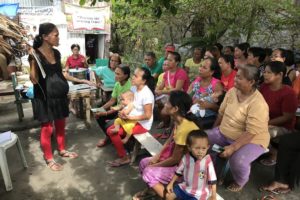The winner of the 2025 award is Dr Alex Bolek
Dignity & Right to Health Award
The Dignity and Right to Health Award is an initiative of ICMDA. The award provides recognition, support and publicity for the most outstanding role models and champions acting to address health and development issues.
It is an international award acknowledging the contributions of Christian doctors, dentists, nurses and other health workers to address health and development issues, including HIV.
The award is an important symbol for ensuring that voices from diverse communities and countries are acknowledged and championed. By granting this award we aim to model, mobilise and encourage creative and sustainable initiatives that enhance the dignity and human rights of people, all made in the image of God, and support communities living with a range of health and development.
Dr Alex Bolek, South Sudan
The life and work of Dr Alex Bolek in South Sudan embodies a vision of hope rooted in one of the world’s most fragile contexts. Since South Sudan’s independence in 2011, the nation has endured prolonged conflict, displacement, and instability. Amid these challenges, Dr Bolek and his wife Helen have chosen to remain, serving their people with perseverance, faith, and compassion.

Trained in medicine in Romania, with postgraduate expertise in Public and Tropical Health, Dr Bolek has combined clinical excellence with public health leadership. His early work in Khartoum and later senior roles with international NGOs, including JHPIEGO, equipped him to lead complex health programmes in fragile settings. Alongside this, he invested deeply in Christian leadership development through the Haggai Institute and the John Maxwell Million Leaders Mandate, driven by a conviction that lasting change comes through equipping others.
In Juba, Dr Bolek founded Rock City Medical Centre on land once occupied by an IDP camp, providing accessible, high-quality care to displaced and low-income communities. He and Helen also established a community primary school, now educating over 300 children, offering stability, hope, and opportunity in a context where education is often inaccessible.
Beyond South Sudan, Dr Bolek serves as Africa Coordinator for ICMDA, strengthening networks, mentoring leaders, and supporting Christian healthcare workers across the continent. Nationally, he chairs CMDA South Sudan, advocating for compassionate, Christ-centred healthcare in a young and wounded nation.
At home, the Boleks live out their faith by caring for vulnerable children within their extended family, modelling Christian hospitality and responsibility.
Dr Alex Bolek’s ministry reflects a holistic gospel—where healthcare, education, discipleship, and leadership development together affirm dignity and the right to health. His work plants enduring seeds of hope for South Sudan and beyond.
Dr Hotlin Ompusunggu, dentist & Co-Founder of Alam Sehat Lestari, Indonesia
Dr Hotlin Ompusunggu is a dentist and the Co-Founder of Alam Sehat Lestari (ASRI), a nongovernmental organisation in West Kalimantan, Indonesia. ASRI integrates dental healthcare and creation care through community-based projects, with a mission to break the cycle between poor health (especially dental), poverty and creation harm (especially loss of forest resources).
Dr Hotlin shares, “As a dentist for more than two decades, I have always wanted to help change society for the better. Since the beginning of my career, I have practiced dentistry in underserved communities as part of my commitment to community development. In 2007, I broadened my horizons beyond dentistry and gained the second title of “conservationist” as I came to believe that development is not complete without including care for the environment and ensuring sustainability of life.”
On co-founding ASRI in 2007, she achieved great success in reducing illegal logging in Gunung Palung National Park, West Borneo. In 2018 she returned to her homeland Sumatra to prove that communities and forests can thrive together.
Dr Hotlin grew up in a Christian family making a personal decision to follow Jesus as a teenager and went on to attend an OMF mission course. She was inspired by her auntie, also a dentist, and was keen to be an agent of change to help others and serve her community.
She draws her foundational inspiration from the Lord’s Prayer, ‘May your kingdom come on earth as it is in heaven’ and wishes to bring shalom to all - peace with God, with self, with community and with creation.
Dr Johnny Oommen, Odisha, India
Dr Johnny Oommen started a community health department in Rayagada district of Odisha in 1994 called Mitra, meaning friend in Sanskrit. Its fourfold vision was of a tribal community enjoying good health, education, economic security and social empowerment.
In a cluster of 56 villages, Mitra provides a comprehensive package of healthcare and education with a priority for malaria. Rayagada has gone from a negative population growth rate of 10% (from the scourge of malaria) to a positive population growth rate of 10%.
Other agencies adopted the Mitra model for malaria prevention and the department has extended its empowerment model to the whole state by training local leaders in collecting and analysing accurate village-based health statistics as part of a joint project with the government and UNICEF.
Following two big interventions - medicated mosquito nets and the DAMAN programme (eradication of malaria in inaccessible areas) - malaria cases in Odisha have dropped by 80 percent since 2018.
Addressing the deficiencies in school education, 16 villages were enabled to start a primary school of their own, with emphasis on local language and culture. Mitra has also initiated over 50 self-help groups, that provide micro-credit and programmes for income generation and community-based health insurance.
Dr Johnny’s wife Mercy has advanced nursing and midwifery training in the hospital by establishing a diploma programme in Nursing, a rare facility in Odisha. Mostly staffed by their own trainees and focusing on local students, the course combines training in hospital based and community health skills.
Johnny is the deputy medical superintendent of Christian Hospital, Bissam Cuttack, and has been instrumental in changing the way people think about rights, development, and the future. After graduating in 1985 and doing further studies in Vellore he was the editor of the Christian Medical Journal of India and Mercy was a past President of the Nursing League of the CMAI. They are both popular teachers and role models for young people and they offer a real-life example of Jesus Christ as a compassionate and pain-sharing servant for the well-being of communities.
Dr David Mills, Papua New Guinea
Dr David Mills moved to the highlands of Papua New Guinea (PNG) at the turn of the millennium and has helped establish an accredited 60-bed District Hospital in Kompiam, Enga Province and the national MMED Rural Training Program in collaboration with the country’s only medical training facility at the School of Medicine and Health Sciences, University of PNG.
 The program has seen been recognised by the University Senate, the Medical Board and is now enshrined in the National Health Plan - Vision 2050. The training is available only to doctors who commit to working concurrently in a rural hospital for the six-year duration of the course.
The program has seen been recognised by the University Senate, the Medical Board and is now enshrined in the National Health Plan - Vision 2050. The training is available only to doctors who commit to working concurrently in a rural hospital for the six-year duration of the course.
This model has succeeded where traditional ‘bonded’ schemes (where doctors receive full training before hopefully returning to do their service time) have not fared as well. The course’s first trainees graduated in 2014 and their specialisation has brought about a major shift in medical culture milieu, with a growing understanding of rural medicine now being seen an established career pathway in PNG.
Alongside the course, the PNG Society for Rural and Remote Health was founded in 2009 which gave rural doctors, other rural health workers, and people with an interest in rural health, a professional home. It has since become a focal point for discussion on rural health issues, giving Government, relevant donors, the media and others a place to come for comment, information and advice. It also gives a formal outlet for rural doctors to make comment and advocate on issues relevant to their communities.
The Enga province struggles with inter-tribal violence and fighting, however, Dr Mills’ faithful service at the Kompiam District Hospital has earned respect in the region as a centre that provides neutral healthcare to all, treating patients from all tribes.
He is well valued among the tribes and on his community visits to discuss health issues his voice is respected and listened to. Churches have been planted in the area alongside programs for maternal care, child care, immunisation, malnutrition, and others. The teaching of medical students ensures the next generation of doctors are trained.
Dr Mills and his family live humble lives that reflect God’s grace and love to all. They work tirelessly for the good of others often with minimal or no pay. They are impartial and do not give or accept bribes and treat and value everyone with respect. Their lives are an example of integrity and truth.
The 2021 dignity and right to health award winner demonstrates visionary and innovative leadership. She has worked for many years in the field of public health and drugs of addiction. She is motivated by the effect that smoking had on shortening the life of a key family member. She has formed support groups, developed policy and advocated for policy change and has succeeded in this becoming legislation.
This prevention work supports the provision of health services for non-communicable diseases including cancer for communities who have difficulties in accessing care due to ethnicity, caste, behaviour, and or other reasons, or are hard to reach due to geographical difficulties, violence or conflicts.
Her work has built a program with outcomes of significant impact at local, national and multinational levels. She empowers others in integrated community responses, She facilitates integration and participation of Christians in best practice models of care. Her work demonstrates excellence in full community involvement and empowerment of the target communities. She links well with government and other actors in a comprehensive approach to issues faced by the target communities. She models creative and compassionate responses that inspire many to similarly enhance the dignity and human rights of the target communities
In her personal life she exemplifies a life that does justice, loves kindness and walks humbly with her God. She assists and encourages individuals to be worshipers of the Living God.
Due to safety considerations we are not able to disclose personal details of the 2021 Dignity and Right to Health award recipient.
Dr Editha Miguel, Agape Rural Health Programme, Palawan, Philippines
Dr Editha Miguel, an infectious disease specialist, graduated from the University of the Philippines. She demonstrates visionary and innovative leadership in addressing the health needs of the communities of Palawan, Philippines. She has a burden for serving the poor and in 1986, with Nurse Judy George, established Agape Rural Health Programme (ARP) in Palawan.
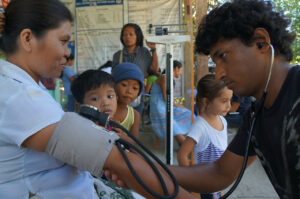 ARP seeks to improve the health conditions of rural communities through holistic health development projects. More than 200 healthcare professionals and those in other fields have received training enabling them to provide health services to more than 60,000 Filipinos.
ARP seeks to improve the health conditions of rural communities through holistic health development projects. More than 200 healthcare professionals and those in other fields have received training enabling them to provide health services to more than 60,000 Filipinos.
The Philippines has made significant investments and advances in health in recent years. However, not all the benefits of this growth have reached the most vulnerable groups, and the health system remains fragmented.
Palawan Island, considered one of the most beautiful islands in the world, is also home to many communities who have difficulty in accessing care due to geographical challenges. Despite substantial progress, achievements have not been uniform and challenges remain.
Dr Editha strongly believes in the importance of training professionals to holistically serve the poor – to meet not just their physical needs (health and income-generation) but also the socio-spiritual needs.
As executive director of Alayka Palawan, the first province-wide health programme in the Philippines, Dr Editha oversaw the training of thousands of community leaders and village health workers. “It empowered the local people by putting their health care in their own hands,” she says.
She readied herself for the founding of such a far-reaching program through her own experience as a community doctor and health trainer in Benguet, under the Barangay (Village) Great Commission Training Centre of Philippine Campus Crusade for Christ. She also served as a holistic healthcare trainer in Sri Lanka and India, as a project consultant for a women’s reproductive health initiative and as the provincial coordinator for a large forum on domestic violence. She continues to serve as a volunteer community preceptor of the University of the Philippines College of Medicine.
Starting from one province, ARP now serves five provinces in the Philippines.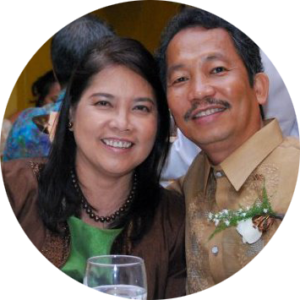
Dr Editha Miguel is a great believer in the Biblical message (2Timothy 2:2) of multiplication: “training a few so that they too can train others. That has become my guiding principle in my life,” she says. “I chose to be involved in programs or jobs that allow me to train others so I can have a greater impact.”
“Looking back, I can see God’s hand orchestrating everything for me,” she says. “I am very blessed to have a husband, Jun, who shares the same passion. Together we continue to mentor individuals to be change agents, helping needy communities looking for innovative ways to improve the quality of life of the people we serve.
“We seek to bring lasting transformation by beginning with inner transformation in the lives of the people as they invite Jesus Christ to be the Lord of their lives and their dreams. ’Only one life it will soon be passed, only what’s done for Christ will last.’
Visit agaperuralprogram.org for more information.
International Care Ministries, Philippines and Dr Milton Amayun
As the twelfth most populous country in the world, the Philippines is home to more than 100 million people. Despite robust economic growth in recent years, 25 million Filipinos still live in extreme poverty on incomes below US$1.25 per day.
At the absolute bottom of this economic ladder are seven million people struggling to survive in ultrapoverty on less than US$0.50 per day. ICM serves the ultrapoor in the Philippines. The population of the areas where ICM reaches is nearly 20 million people. Of those, 2.2 million people live in ultrapoverty on less than US$0.50 per day.
Transform: Learning in Community
A local pastor and six volunteers invite 30 of the poorest families in the community to join the weekly Transform training classes. This new network of support and encouragement becomes a safe place for learning to take hold.
Once a week, ICM Trainers teach a course designed to address common problems faced by poor families. At the end of four months, the whole community enjoys deeper relationships, healthier families, greater productivity and hope for tomorrow.
In 1992, a group of passionate Filipino pastors were moved by the extreme poverty they saw every day in their home city of Bacolod, Philippines. They started feeding and handing out medicines, and International Care Ministries was born.
For more than 25 years, ICM has been providing help, inspiring hope and creating change for families living in extreme poverty in the Philippines.
Over twenty-five years later, several of the founding pastors are still part of the local leadership. ICM now employs several hundred Filipinos who have reached over one million people with holistic transformation.
Living in ultrapoverty means living without hope. For children living on less than US$0.50 per day, every day is a struggle to meet even the most basic needs. One medical crisis can wipe out any progress made in the fight out of poverty. Transform’s health curriculum equips mothers to better provide for their children in the areas of hygiene, sanitation, disease prevention and nutrition Transform rescues children from malnutrition through feeding and provides medical interventions in emergencies.
ICM takes a chance on families that other organisations can’t or won’t reach. Their Vision is for ultrapoor families to be freed from physical, emotional and spiritual bondage. Among their key values are hope and spiritual life. They believe that all are made in the image of God and fulfilment is realised in relationship with God. Without compulsion, they invite people to consider the message of God’s love, forgiveness and grace. Hope is the key: progress out of poverty must start with the belief that change is possible. The biblical values taught during Transform foster attitudes and behaviours that result in strong relationships.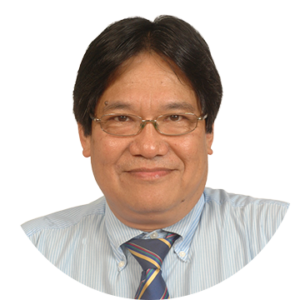
Dr Milton, from the Philippines, and his wife Raija, originally from Finland, met at the ICMDA conference in Switzerland in 1978. They were both new graduates from medical school and represented two countries from opposite ends of the globe. After a long and fruitful ministry with World Vision in multiple countries facing multiple challenges, they returned to the Philippines to work for ICM. Raija and Milton, based in Manila and now president of ICM, exemplify lives that value justice, love kindness and walk humbly with God, and assist individuals to be worshipers of the living God.
Visit www.caremin.com for more information.
2025 Dr Alex Bolek, South Sudan
2024 Dr Hotlin Ompusunggu, Indonesia
2023 Dr Johnny Oomen, Mitra, India
2022 Dr David Mills, Rural healthcare in Papua New Guinea
2021 Kept confidential for security reasons
2020 Dr Editha Miguel, Agape Rural Health Programme (ARP), Palawan, Philippines
2019 Dr Milton Amayun, International Care Ministries (ICM), Philippines
2018 Health Serve, Singapore
2017 Project Burans, Uttarakhand, North India
2016 Dr Anil Cherian, Kerala, South India
2015 Dr Andrew Reid, Champions For Life Zimbabwe
2014 Beacon of Hope, Kenya
2012 Joint winners Drs Isac & Vijila David and Dr Saira Paulose, India
2011 Dr Olive Frost, Mumbai, India
2010 Joint winners - Dr Joseph Kwong-Leung Yu and Dr Schneider, Malawi, Gambia & Uganda
2009 Dr Stephen Watiti, Uganda
2008 Dr Geoff Foster, Zimbabwe
2007 Prof Ruth Nduati
2006 Dr Biangtung Langkham, Churachandpur, Manipur, India
The award will be given to individuals and/or community based and national organisations that exhibit excellence, outstanding leadership and compassion in responding to various health challenges. The awarding committee seek nominees who demonstrate the following:
- Leadership
An individual or organisation that demonstrates visionary and innovative leadership. - Target group – marginalised or hard to reach communities
An individual or organisation whose primary provision of health services is for communities who have difficulty in accessing care due to ethnicity, caste, behaviour, and/or other reasons, or are hard to reach due to geographical difficulties, violence or conflicts. - Programme outcomes
- Significant impact at local and wider level
- Empowers others in integrated community responses
- Facilitates church integration and participation in best practice models of care
- Demonstrates excellence in full community involvement and empowerment of the target communities
- Works, facilitates and advocates for gender equality in community participation and response to issues faced by the target communities
- Links well with government and other national bodies in a comprehensive approach to issues faced by the target communities
- Models creative and compassionate responses that inspires others to enhance the dignity and human rights of the target communities
- Personal Life
- Exemplifies a life that does justice, loves kindness and walks humbly with God
- Assists individuals to be worshipers of the living God
An important part of this award process is to seek appropriate publicity that will allow Christian witness and action to be an encouragement and model to others.
For more information please contact Michael Burke, ICMDA Leadership in Christian Health and Development Initiative
Call for nominations - 30 August 2026
Closure of nominations - 1 November 2026
Committee reviews nominations - November 2026
Announcement of winner - 1 December 2026
